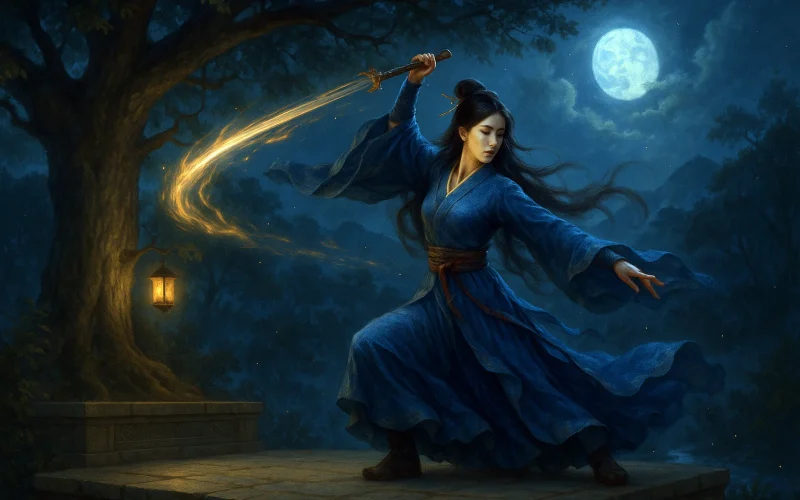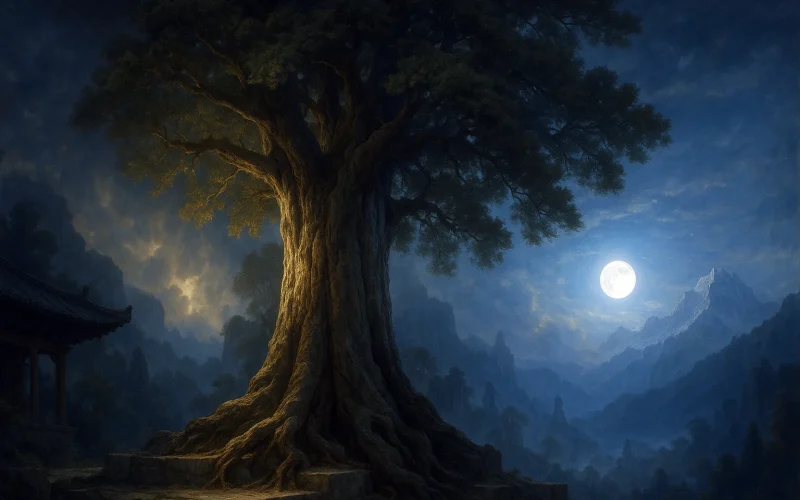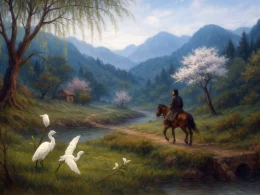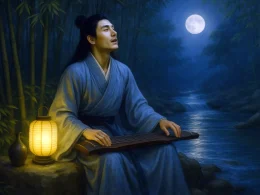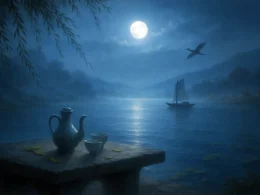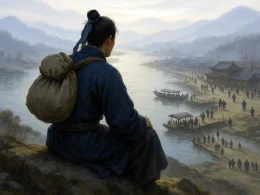There lived years ago the beautiful Gongsun,
Who, dancing with her dagger, drew from all four quarters
An audience like mountains lost among themselves.
Heaven and earth moved back and forth, following her motions,
Which were bright as when the Archer shot the nine suns down the sky
And rapid as angels before the wings of dragons.
She began like a thunderbolt, venting its anger,
And ended like the shining calm of rivers and the sea...
But vanished are those red lips and those pearly sleeves;
And none but this one pupil bears the perfume of her fame,
This beauty from Lingying, at the Town of the White God,
Dancing still and singing in the old blithe way.
And while we reply to each other's questions,
We sigh together, saddened by changes that have come.
There were eight thousand ladies in the late Emperor's court,
But none could dance the dagger-dance like Lady Gongsun.
...Fifty years have passed, like the turning of a palm;
Wind and dust, filling the world, obscure the Imperial House.
Instead of the Pear-Garden Players, who have blown by like a mist,
There are one or two girl-musicians now-trying to charm the cold Sun.
There are man-size trees by the Emperor's Golden Tomb
I seem to hear dead grasses rattling on the cliffs of Qutang.
...The song is done, the slow string and quick pipe have ceased.
At the height of joy, sorrow comes with the eastern moon rising.
And I, a poor old man, not knowing where to go,
Must harden my feet on the lone hills, toward sickness and despair.
Original Poem:
「观公孙大娘弟子舞剑器行」
杜甫
昔有佳人公孙氏, 一舞剑器动四方。
观者如山色沮丧, 天地为之久低昂。
霍如羿射九日落, 矫如群帝骖龙翔,
来如雷霆收震怒, 罢如江海凝清光。
绛唇珠袖两寂寞, 晚有弟子传芬芳。
临颍美人在白帝, 妙舞此曲神扬扬。
与余问答既有以, 感时抚事增惋伤。
先帝侍女八千人, 公孙剑器初第一。
五十年间似反掌, 风尘澒洞昏王室。
梨园子弟散如烟, 女乐余姿映寒日。
金粟堆前木已拱, 瞿塘石城草萧瑟。
玳筵急管曲复终, 乐极哀来月东出。
老夫不知其所往? 足茧荒山转愁疾。
Interpretation:
This poem was composed in the second year of the Dali era of Emperor Daizong of the Tang Dynasty (767 AD), during Du Fu's stay in Kuizhou (present-day Fengjie, Chongqing). At the time, the Tang Dynasty was in decline, and the aftermath of the An Lushan Rebellion had yet to subside. While staying at the residence of Yuan Chi, the Deputy Magistrate of Kuizhou, Du Fu watched a performance of the "Sword Dance" by Li Shiniang, a disciple of Gongsun Daniang. Moved by the decline of the once-prosperous era and the scattering of the imperial troupe, as well as his own displacement, Du Fu wrote this poem to express his sorrow over the passage of time and the changing world.
First Couplet: "昔有佳人公孙氏,一舞剑器动四方。"
Xī yǒu jiārén Gōngsūn shì, yī wǔ jiàn qì dòng sìfāng.
In the past, there was a renowned dancer, Gongsun Daniang, whose Sword Dance captivated all who saw it.
The opening lines introduce Gongsun Daniang as a celebrated figure, with "captivated all" highlighting her extraordinary skill and the awe she inspired.
Second Couplet: "观者如山色沮丧,天地为之久低昂。"
Guān zhě rú shān sè jǔsàng, tiāndì wèi zhī jiǔ dī áng.
Spectators gathered like mountains, their expressions awestruck; heaven and earth seemed to rise and fall with her movements.
This couplet uses "like mountains" to describe the crowd and "awestruck" to convey their reaction, emphasizing the dance's profound impact and Gongsun Daniang's unparalleled artistry.
Third Couplet: "霍如羿射九日落,矫如群帝骖龙翔。"
Huò rú Yì shè jiǔ rì luò, jiǎo rú qún dì cān lóng xiáng.
Her movements were as swift and powerful as Yi shooting down the nine suns, as agile as emperors riding dragons through the sky.
Mythological allusions are used to depict the dance's vigor, speed, and fluidity, highlighting the strength and dynamism of the Sword Dance.
Fourth Couplet: "来如雷霆收震怒,罢如江海凝清光。"
Lái rú léitíng shōu zhènnù, bà rú jiānghǎi níng qīng guāng.
Her dance began like thunder, fierce and commanding; it ended like still waters, serene and radiant.
The contrast between thunder and still waters captures the dance's rhythm and grandeur, showcasing its dynamic beauty.
Fifth Couplet: "绛唇珠袖两寂寞,晚有弟子传芬芳。"
Jiàng chún zhū xiù liǎng jìmò, wǎn yǒu dìzǐ chuán fēnfāng.
Gongsun Daniang's red lips and jeweled sleeves are now silent, but her disciple carries on her legacy.
These lines shift from Gongsun Daniang to her disciple, Li Shiniang, using "silent" to imply the decline of a golden age and the scattering of talent, evoking deep sorrow.
Sixth Couplet: "临颍美人在白帝,妙舞此曲神扬扬。"
Lín Yǐng měirén zài Báidì, miào wǔ cǐ qǔ shén yángyáng.
Now, Li Shiniang performs this dance in Baidi, her movements still spirited and captivating.
The contrast between Gongsun Daniang's past glory and Li Shiniang's current displacement underscores the inevitability of change.
Seventh Couplet: "与余问答既有以,感时抚事增惋伤。"
Yǔ yú wèndá jì yǒu yǐ, gǎn shí fǔ shì zēng wǎn shāng.
After speaking with Li Shiniang, I learned her story, which deepened my sorrow over the times and my own circumstances.
These lines transition from the dance to the poet's personal reflections, revealing the source of his emotional response.
Eighth Couplet: "先帝侍女八千人,公孙剑器初第一。"
Xiāndì shìnǚ bāqiān rén, Gōngsūn jiàn qì chū dì yī.
In the past, Emperor Xuanzong's court had eight thousand female performers, but Gongsun's Sword Dance was unmatched.
The "eight thousand" serves to highlight Gongsun Daniang's preeminence, setting the stage for the historical changes to come.
Ninth Couplet: "五十年间似反掌,风尘澒洞昏王室。"
Wǔshí nián jiān sì fǎn zhǎng, fēngchén hòngdòng hūn wángshì.
Fifty years have passed in the blink of an eye; turmoil has engulfed the land, and the royal house is in disarray.
The brevity of time and the magnitude of change are starkly contrasted, emphasizing the upheaval caused by the An Lushan Rebellion.
Tenth Couplet: "梨园子弟散如烟,女乐余姿映寒日。"
Líyuán zǐdì sàn rú yān, nǚ yuè yú zī yìng hán rì.
The members of the imperial troupe have scattered like smoke; only Li Shiniang's dance remains, casting a faint light in the cold sun.
"Scattered like smoke" describes the dispersal of the troupe, while "casting a faint light" symbolizes Li Shiniang's solitary perseverance, evoking the impermanence of prosperity.
Eleventh Couplet: "金粟堆前木已拱,瞿塘石城草萧瑟。"
Jīnsù duī qián mù yǐ gǒng, Qútáng shíchéng cǎo xiāosè.
Before Emperor Xuanzong's tomb, the trees have grown tall; in Baidi, the grass withers in desolation.
These lines use real scenes to depict decline, further intensifying the poet's lament over the passage of time.
Twelfth Couplet: "玳筵急管曲复终,乐极哀来月东出。"
Dài yán jí guǎn qǔ fù zhōng, lè jí āi lái yuè dōng chū.
The banquet's lively music has ended, and as joy turns to sorrow, the moon rises in the east.
"Joy turns to sorrow" encapsulates the theme of life's impermanence and the inevitability of decline.
Thirteenth Couplet: "老夫不知其所往?足茧荒山转愁疾。"
Lǎo fū bùzhī qí suǒ wǎng? Zú jiǎn huāngshān zhuǎn chóu jí.
This old man knows not where to go; with calloused feet, I tread the barren hills, my sorrow deepening with each step.
The poem concludes with the poet's own sense of displacement, his emotions profound and lingering.
Overall Appreciation
This poem uses dance as a metaphor to express the poet's nostalgia for a bygone era and his sorrow over the present. It not only celebrates Gongsun Daniang's extraordinary skill but also highlights Li Shiniang's resilience in carrying on her teacher's legacy. With deep emotion and powerful language, the poem reflects on the passage of time and the inevitability of change.
Writing Characteristics
- Using Dance as a Metaphor, Deep Emotion: The poet uses Gongsun Daniang's dance to reflect on the changes of the times and Li Shiniang's displacement to express his own sense of loss, creating a moving and layered narrative.
- Blending Reality and Imagination, Grand Imagery: The poem alternates between the beauty of the dance and the poet's reflections on the rise and fall of nations and the impermanence of life, creating a profound and expansive atmosphere.
- Rich Allusions, Deep Meaning: Allusions such as "Yi shooting down the nine suns," "emperors riding dragons," and "turmoil engulfing the land" enrich the poem's imagery and deepen its thematic resonance.
Insights
This poem reminds us that life, like a dance, may shine with brilliance but is ultimately subject to the erosion of time and circumstance. Through the rise and fall of Gongsun Daniang, Du Fu reflects on the changes of history, expressing both his helplessness and his contemplation of the past. The poet hopes that people will remember those who, despite adversity, persevere in preserving and passing on their craft. It is this spirit that allows the flame of civilization to endure.
Poem translator:
Kiang Kanghu
About the poet
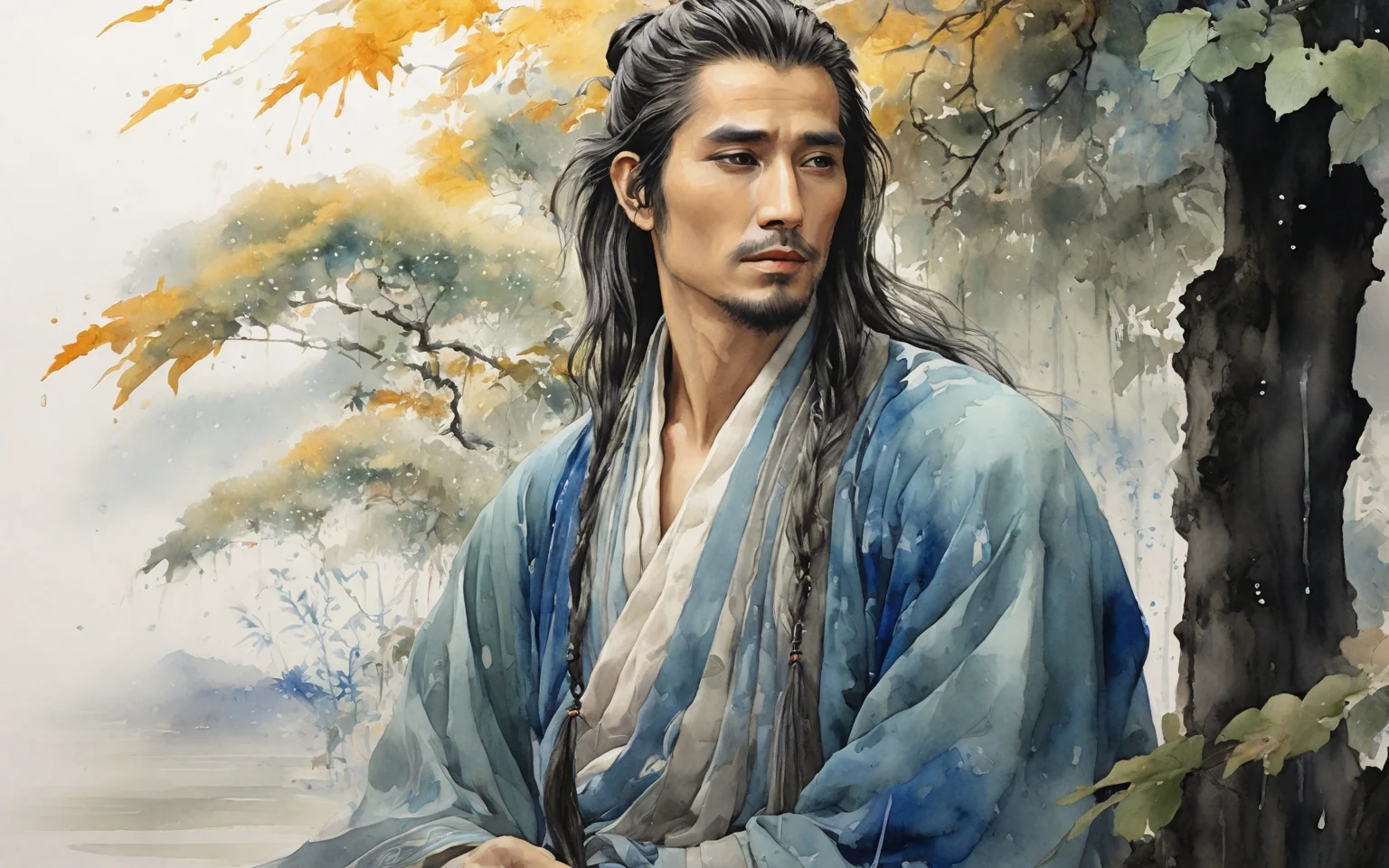
Du Fu (杜甫), 712 - 770 AD, was a great poet of the Tang Dynasty, known as the "Sage of Poetry". Born into a declining bureaucratic family, Du Fu had a rough life, and his turbulent and dislocated life made him keenly aware of the plight of the masses. Therefore, his poems were always closely related to the current affairs, reflecting the social life of that era in a more comprehensive way, with profound thoughts and a broad realm. In his poetic art, he was able to combine many styles, forming a unique style of "profound and thick", and becoming a great realist poet in the history of China.






